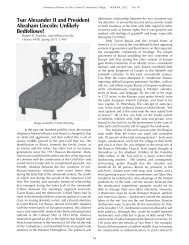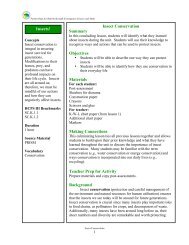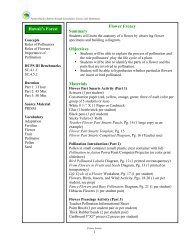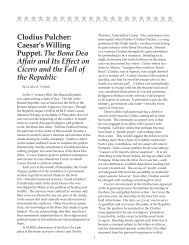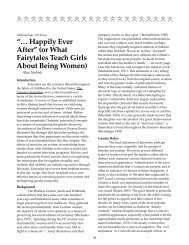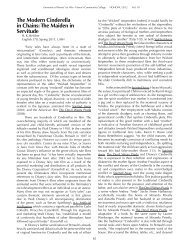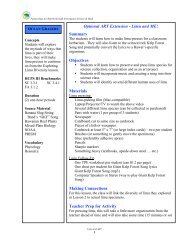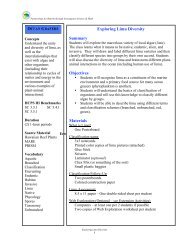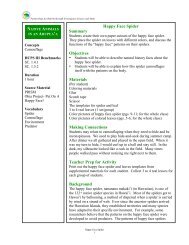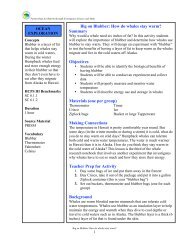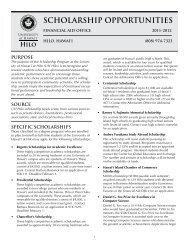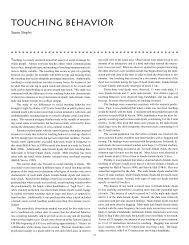A JOURNAL OF ACADEMIC WRITING VOLUME 8
A JOURNAL OF ACADEMIC WRITING VOLUME 8
A JOURNAL OF ACADEMIC WRITING VOLUME 8
Create successful ePaper yourself
Turn your PDF publications into a flip-book with our unique Google optimized e-Paper software.
d d d d d d d d d d d d d d d d d d d d d d<br />
For the Time-Being:<br />
Buddhism, Dōgen, and<br />
Temporality<br />
Anthony Ridenour<br />
Philosophy 302<br />
Few philosophical and religious traditions around the<br />
world can claim such a long history and malleable tradition as<br />
Buddhism. It has come to mean many things for many people<br />
and has spread to nearly every corner of the earth. As Buddhism<br />
was transplanted here and there, it appropriated itself to the<br />
surrounding social environment. As such, Buddhist tradition<br />
takes many forms, almost paradoxically at times. Through the<br />
many configurations, however, there are general themes and<br />
concepts that keep Buddhist traditions “Buddhist.”<br />
From the beginning, from Shakyamuni Buddha’s<br />
enlightenment, the Buddha Way was a practical, viable means<br />
for human beings to attain supreme liberation from the fetters<br />
of life. By the time Buddhism reached the shores of medieval<br />
Japan, the many Dharmas had been written and commented<br />
on, schools of thought had arisen and fallen, and the real work<br />
of Buddhist thinkers lied in the details. One such detail was<br />
that of time. The problem of time in the history of Buddhist<br />
thought has often been regarded as a peripheral result of larger<br />
issues, such as emptiness and causality, Buddha-Nature, and so<br />
forth (Kim, 142).<br />
One such Buddhist thinker of medieval Japan, Zen Master<br />
Dōgen, wrestled with the problem of time systematically, in<br />
true Zen fashion, and came to view the understanding of time<br />
as central to understanding key concepts such as enlightenment,<br />
practice, duality and non-duality, impermanence, activity, and<br />
existence. Attempted here is a probing into Dōgen’s conception<br />
of time as a means to better and more completely understand<br />
these other key concepts of Buddhism.<br />
Probing the nature of time is certainly not only found in<br />
Buddhism. The earliest philosophers of the world struggled<br />
with a definition of time. However, it doesn’t take a philosopher<br />
to experience time; everyone has a common-sense notion of<br />
time. Most commonly (in Western thought), time is seen as a<br />
container, the stage in which all actions and events transpire<br />
through some duration.<br />
To people such as Isaac Newton, and most scientists, time<br />
is fundamental to the nature and structure of the universe; it is a<br />
linear dimension, a measurable quantity with a certain direction<br />
moving from past to future. Another commonly held view of<br />
time is that time is a mental construct used as a measurement<br />
system to quantify the motion of objects and the intervals<br />
between sequential events. Thus, time is seen not as a substance<br />
of the universe, but as a “substance” of the human intellect.<br />
Ancient Indian philosophy saw time as cyclic in nature.<br />
While the teachings of the Buddha deviated from the Vedantic<br />
philosophies prevalent in India at the time, the concept of time<br />
as cyclic remained. Indeed, the whole of Indian philosophy<br />
(culminating in enlightenment) sought release from the cyclic<br />
nature of the Samsaric world, or the wheel of becoming. As<br />
stated by Stambaugh,<br />
“Dōgen follows Nāgārjuna in his rejection of nirvana<br />
or liberation as something beyond the cycles of birth<br />
and death. But, instead of primarily conceiving of<br />
an “identity” of the cycles of birth and death with<br />
liberation from them, which was Nāgārjuna’s innovative<br />
insight, Dōgen’s focus appears to be primarily on the<br />
nature of “being-time” (the Japanese word is uji) and<br />
the possible experience of liberation inherent in it.<br />
Thus, ... that [orientation] of Dōgen is experiential and<br />
phenomenological.”<br />
Here we see a concise description of Dōgen’s philosophic<br />
interest: that time is to be understood and experienced as<br />
being, as existence itself. Time is nothing other than being<br />
itself. To quote Dōgen’s own writings in his seminal work the<br />
Shōbōgenzō (specifically the fascicle Uji), “The central meaning<br />
of being-time is: every being in the entire world is related to<br />
each other and can never be separated from time,” (Nishiyama,<br />
Stevens 69). For Dōgen, this is the correct way to view time and<br />
existence. He expresses his disdain for the common view of time<br />
in the following way: “Do not think of time as merely flying by;<br />
do not only study the fleeting aspect of time. If time is really<br />
flying away, there would be a separation between time and<br />
ourselves. If you think that time is just a passing phenomenon,<br />
you will never understand being-time”(Kim).<br />
Furthermore, he says: “Indeed, being-time covers<br />
everything. It is pure Being; in it resolve, practice,<br />
enlightenment and detachment are acting, i.e., not different<br />
from being-time. The eternal present includes limitless space;<br />
there is nothing beside this” (Kim). With these two quotes, one<br />
can grasp that without the understanding of being-time one<br />
is lost in the fleeting fatalism of durational temporality (time<br />
flying by) where we cling to particulars and imagine time as<br />
ever flowing past the present moment. With an understanding<br />
HOHONU Volume 8 2010 - 87



